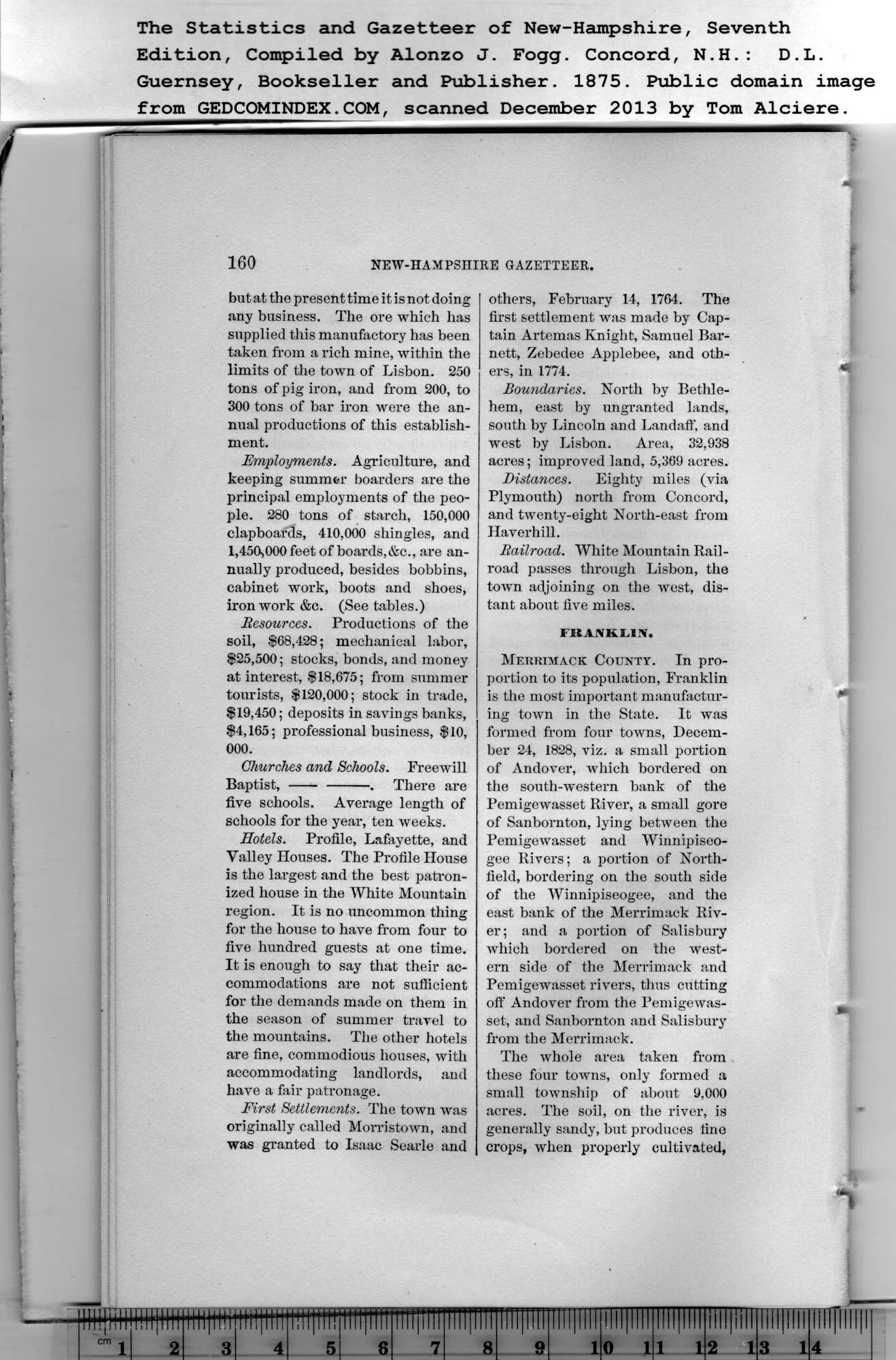|
but at the present time it is not doing
any business. The ore which has
supplied this manufactory has been
taken from a rich mine, within the
limits of the town of Lisbon. 250
tons of pig iron, and from 200, to
300 tons of bar iron were the an-
nual productions of this establish-
ment.
Employments. Agriculture, and
keeping summer boarders are the
principal employments of the peo-
ple. 280 tons of starch, 150,000
clapboards, 410,000 shingles, and
1,450,000 feet of boards, &c., are an-
nually produced, besides bobbins,
cabinet work, boots and shoes,
ironwork &c. (See tables.)
Resources. Productions of the
soil, $68,428; mechanical labor,
$25,500; stocks, bonds, and money
at interest, $18,675; from summer
tourists, $120,000; stock in trade,
$19,450; deposits in savings banks,
$4,165; professional business, $10,
000.
Churches and Schools. Freewill
Baptist,--. There are
five schools. Average length of
schools for the year, ten weeks.
Hotels. Profile, Lafayette, and
Valley Houses. The Profile House
is the largest and the best patron-
ized house in the White Mountain
region. It is no uncommon thing
for the house to have from four to
five hundred guests at one time.
It is enough to say that their ac-
commodations are not sufficient
for the demands made on them in
the season of summer travel to
the mountains. The other hotels
are fine, commodious houses, with
accommodating landlords, and
have a fair patronage. |
First Settlements. The town was
originally called Morristown, and
was granted to Isaac Searle and
others, February 14, 1764. The
first settlement was made by Cap-
tain Artemas Knight, Samuel Bar-
nett, Zebedee Applebee, and oth-
ers, in 1774.
Boundaries. North by Bethle-
hem, east by ungranted lands,
south by Lincoln and Landaff, and
west by Lisbon. Area, 32,938
acres; improved land, 5,369 acres.
Distances. Eighty miles (via
Plymouth) north from Concord,
and twenty-eight North-east from
Haverhill.
Railroad. White Mountain Rail-
road passes through Lisbon, the
town adjoining on the west, dis-
tant about five miles.
FRAKKLIIV.
Merrimack County. In pro-
portion to its population, Franklin
is the most important manufactur-
ing town in the State. It was
formed from four towns, Decem-
ber 24, 1828, viz. a small portion
of Andover, which bordered on
the south-western bank of the
Pemigewasset River, a small gore
of Sanbornton, lying between the
Pemigewasset and Winnipiseo-
gee Rivers; a portion of North-
field, bordering on the south side
of the Winnipiseogee, and the
east bank of the Merrimack Riv-
er; and a portion of Salisbury
which bordered on the west-
ern side of the Merrimack and
Pemigewasset rivers, thus cutting
off Andover from the Pemigewas-
set, and Sanbornton and Salisbury
from the Merrimack.
The whole area taken from
these four towns, only formed a
small township of about 9,000
acres. The soil, on the river, is
generally sandy, but produces line
crops, when properly cultivated, |
